Lately I feel like everyone is talking about masculinity and what it means to be a good dude. Last month, I was on a panel at the Pride on the Page book festival with Jacob Tobia (Sissy) who was saying that we’ve spent decades expanding gender roles for women in mainstream society—and women finally won the right to wear pants in the workplace (for now)—but meanwhile, too many guys men remain trapped, unable to express healthy emotions or process all of their trauma.
As someone who was so successful at being a man that I actually graduated, I want to help!
So it’s a really good thing that science fiction and fantasy offer us so many excellent examples of guys who are secure in their masculinity and ready to do the right thing, even when it’s tough.
Superman (DC Comics)
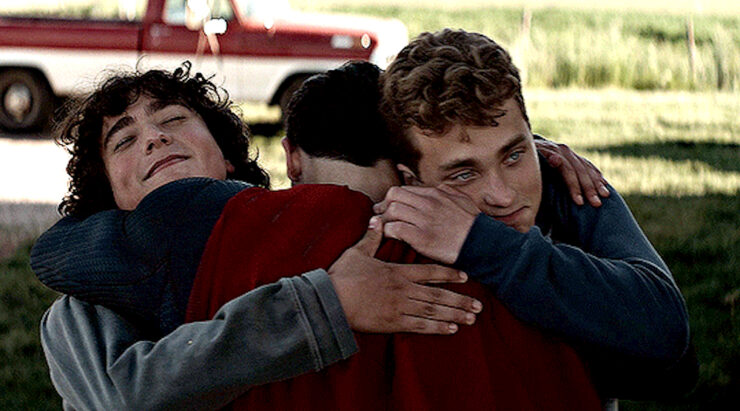
The best word I can think of to describe Superman is “nurturing.” There are so many images online of Supes hugging someone or offering comfort to someone in pain. The most powerful superhero is also the most tender and compassionate, to the point where his greatest superpower is the ability to take care of people in pain. My favorite onscreen Superman is now Tyler Hoechlin’s gentle, self-effacing dad from Superman & Lois, who wears his heart on his sleeve and is willing to open up about his feelings. Superman doesn’t just have super-hearing—he has super-listening.
Ballister Boldheart (Nimona)
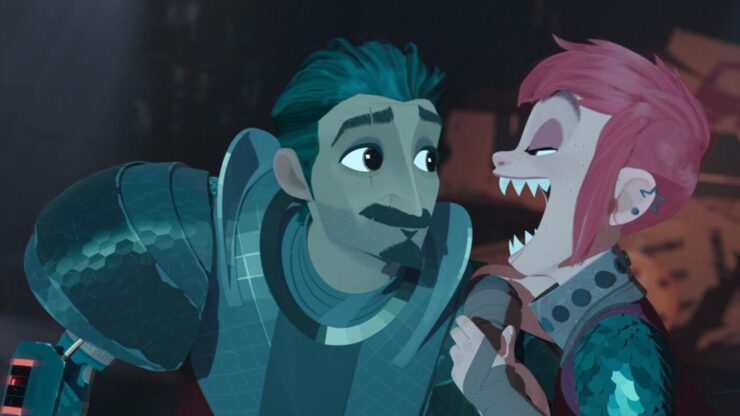
Ballister starts out as an underdog—the first knight chosen from among the common folk—and then he loses everything after being framed for a terrible crime. You’d forgive him for turning bitter and closed off—but when he meets the shapeshifting Nimona, he’s still willing to see the good in her and to become her partner in crime. He keeps doing the right thing, even when he’s in pain, and forgives his boyfriend Ambrosius for some truly hurtful behavior (albeit in the line of duty). Sir Ballister is a mensch.
The Middleman (The Middleman)
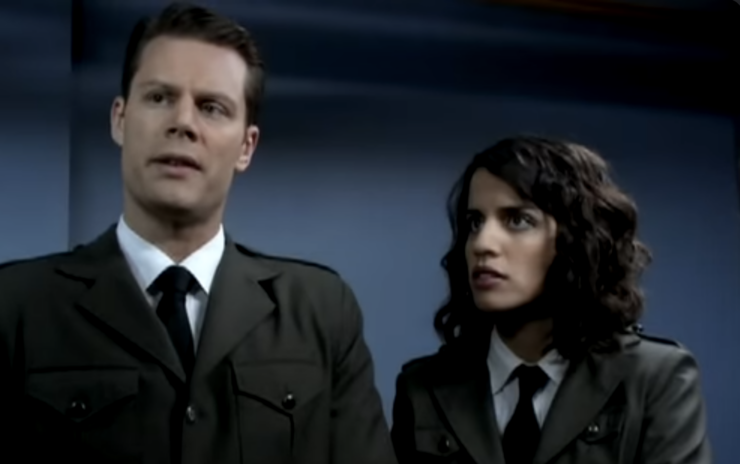
At first blush, the titular hero of the criminally underrated superhero show appears to be just an uptight caricature of an Eisenhower-era square-jawed straight arrow. He drinks milk instead of anything with caffeine or alcohol, and delivers ridiculous lines with a deadpan delivery. But over the course of one brilliant season, the Middleman reveals layers of character, along with a keen sense of honor. One of my favorite episodes puts the Middleman in contrast with his predecessor, a toxic tool who gives really bad advice to the Middleman’s friend Wendy.
King T’Challa (Black Panther)
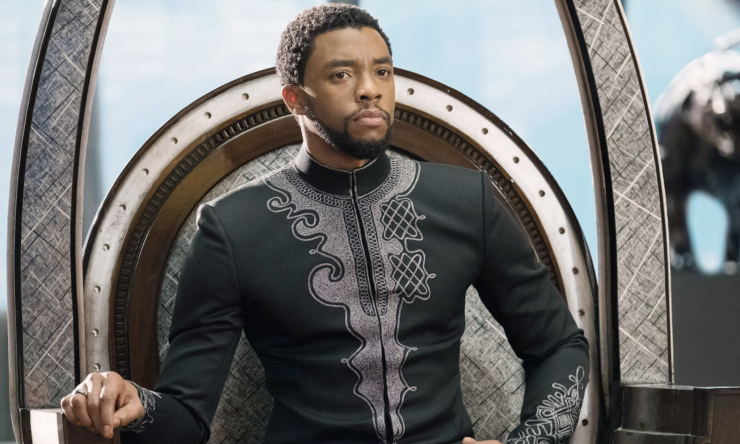
Just as Superman is absurdly powerful, T’Challa has it all: he’s not only one of the greatest superheroes in the Marvel Universe, he’s also king of one of the most advanced countries, Wakanda. He’s also suffered grievous loss, including the death of his father, King T’Chaka. But as played unforgettably by Chadwick Boseman, T’Challa is a wise leader, one who’s able to laugh at himself but also willing to listen to his council and do the right thing. Even when it costs him a lot, he upholds his code of honor. (And I highly recommend Christopher Priest’s formative run on Black Panther for more of T’Challa being a great ruler and a good man, though he’s willing to fight dirty when circumstances warrant.)
Captain Pike (Star Trek: Strange New Worlds)
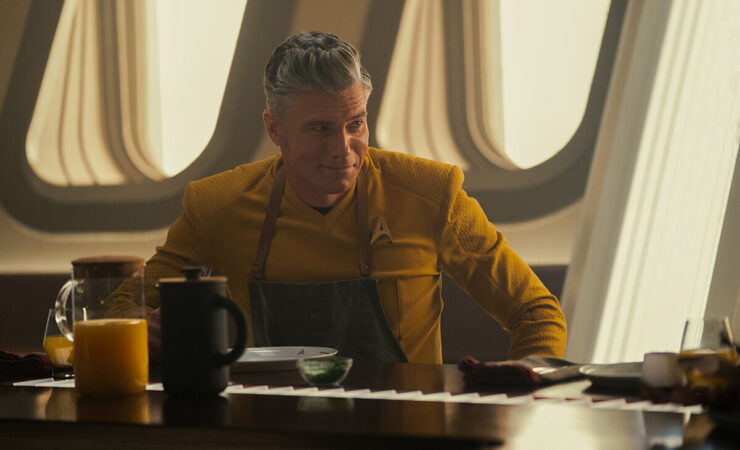
Star Trek is full of men who uphold lofty principles while holding their heads high. But Christopher Pike is pretty much the platonic ideal of a good dad. He’s strong and resolute, but also generous and fair. He’s surrounded by people who are good at their jobs, and he doesn’t second-guess them or try to undermine them in any way—instead, he lifts them up and gives them more confidence. Confronted with a scary vision of his own future, he works through it by talking it through with the people he trusts. And he still manages to be a relaxed, reassuring presence. Plus he’s always cooking delicious food. Pike is exhibit A for being secure in your own masculinity.
Steven Universe (Steven Universe)
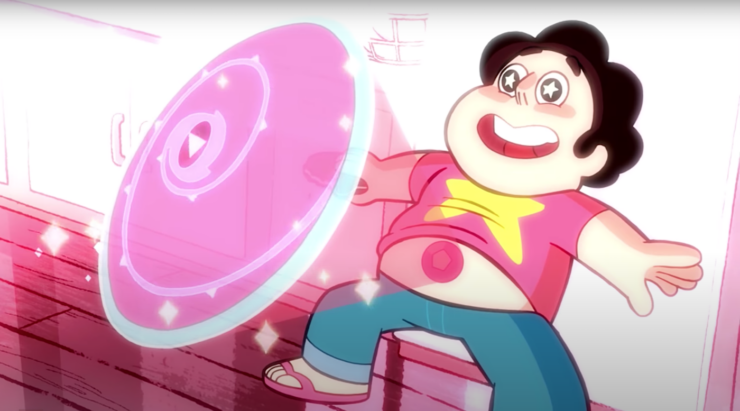
For most of the episodes of Steven Universe, Steven is a bundle of cheerfulness and friendliness, always willing to see the best in everyone—even if they’re trying to kill him. He finds a way to save the people he loves, sometimes against terrible odds, and he even helps the genocidal, imperialist diamonds to be better people. He’s happy to have a shield while letting his friend Connie wield the sword. But most of all, in the sequel show Steven Universe Future, he does the hard work of confronting his trauma, even if he struggles with admitting it at first.
Cheese (Reservation Dogs)
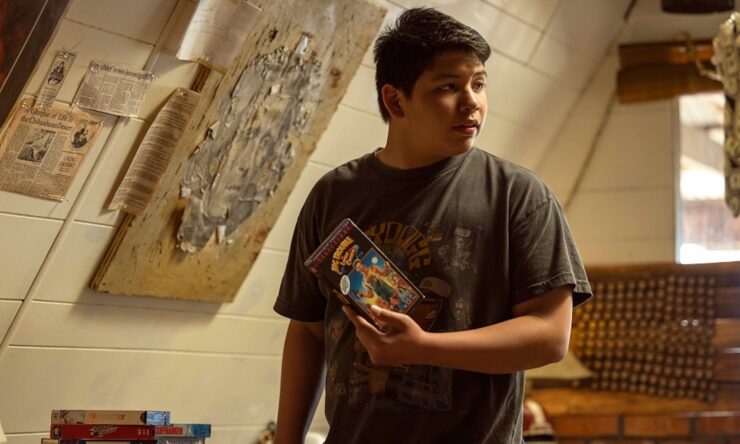
Reservation Dogs isn’t classified as a genre show, but it does feature a lot of magical realist elements. And Cheese is an incredible character, a turbo-nerd artist who usually gets the best lines of dialogue. In particular, though, I’m blown away by “Frankfurter Sandwich,” an episode in the final season where Cheese goes on a male-bonding trip with some older men and winds up leading them gently to confront their buried traumas. It’s one of the best episodes of television I’ve ever seen.
Uncle Iroh (Avatar: The Last Airbender)
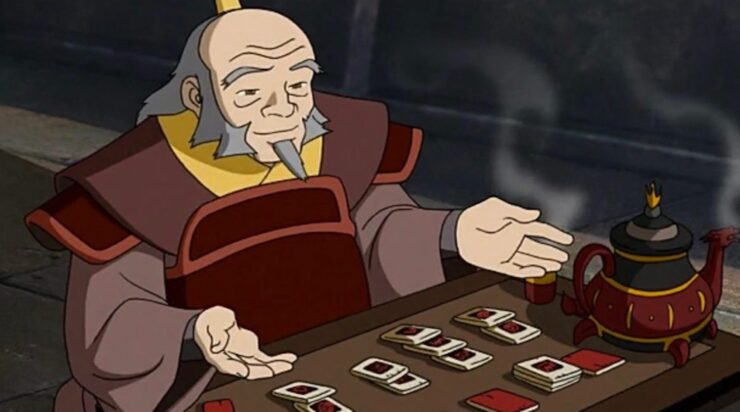
A former military leader, Uncle Iroh has settled into drinking tea and goofing off, and serves a gentle mentor to his hotheaded nephew Prince Zuko. He’s a huge part of the reason why Zuko becomes a better person over the course of ATLA. To be sure, Iroh did some terrible things when he was younger, but now he’s gotten over himself and just wants to hang out and make really good tea. (Note: I came up with Iroh thanks to this Reddit thread.)
Din Djarin (The Mandalorian)
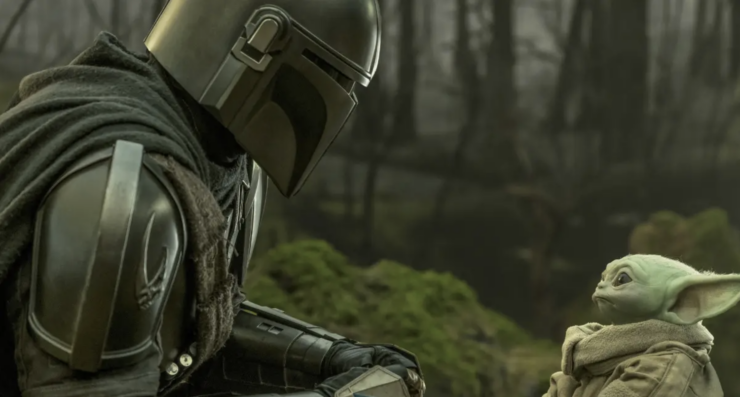
Okay, sure: the Mandalorian works as a bounty hunter, and sometimes his job is a dirty one. But the thing I admire about Din Djarin is the fact that he has a code of honor that he sticks to—except that he’s willing to break it to save his adopted son, Grogu. Specifically, he takes off his helmet when there’s no other way to rescue Grogu, and he pays the price for it. The only reason that he adopts Grogu in the first place is because he decides there are lines he won’t cross, and selling a child to bad people is one of them. And he’s a really good dad! Plus when he gets the Darksaber, he doesn’t cling to it, but rather finds a way to give it to its rightful owner, Bo Katan.
Sunny (Into the Badlands)
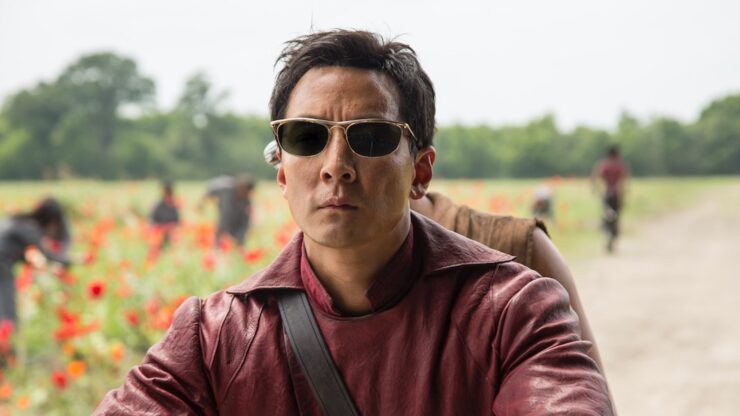
In a post-apocalyptic world, five hundred years from now, Sunny is the right-hand man to the Baron Quinn, one of the warlords who dominate the Badlands. Sunny is constantly thrown into situations where he has divided loyalties, or where he has to choose between following orders and doing the right thing, and he usually finds a way to do the right thing. (Even though he’s done some pretty terrible things in the past.) When he takes M.K., an orphan with a mysterious power, under his wing, he does everything he can to teach and protect his new charge.
Henry Deacon (Eureka)
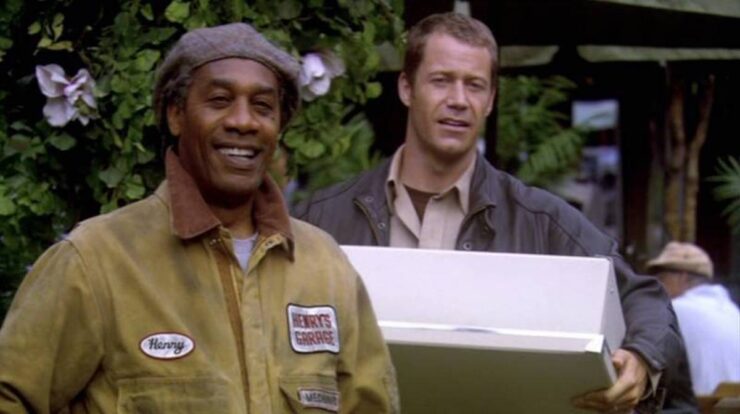
In a “town full of geniuses,” Henry Deacon might just be the smartest of them all—but when this underrated show begins, he’s working as a mechanic because he has ethical objections to the work that Global Dynamics is doing. Henry isn’t just the guy who steps in and fixes things when all the out-of-control science goes off the rails, he’s also the town’s moral center. (And eventually, he becomes its mayor.) Emmy-winning actor Joe Morton, who plays Henry, also plays a resourceful, kind alien refugee in the movie The Brother From Another Planet.
Frodo and Samwise (The Lord of the Rings)
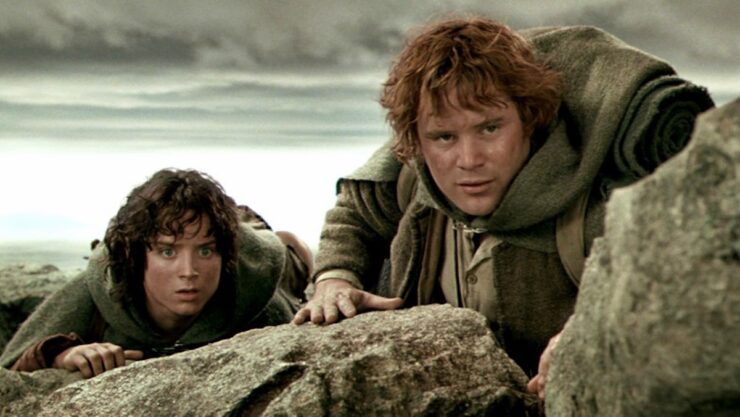
In a world of warriors, wizards, and supernatural badasses, Frodo is just a humble regular dude, who takes on a burden that would crush almost anybody and carries it (almost) to the finish line, battling temptation the entire way. And Samwise is the steadfast friend without whom Frodo couldn’t possibly have made it.
This article was originally published at Happy Dancing, Charlie Jane Anders’ newsletter, available on Buttondown.
Charlie Jane Anders is the author of the young-adult trilogy Victories Greater Than Death, Dreams Bigger Than Heartbreak, and Promises Stronger Than Darkness, along with the short story collection Even Greater Mistakes. She’s also the author of Never Say You Can’t Survive (August 2021), a book about how to use creative writing to get through hard times. Her other books include The City in the Middle of the Night and All the Birds in the Sky. She co-created Escapade, a trans superhero, for Marvel Comics, and featured her in New Mutants Vol. 4 and the miniseries New Mutants: Lethal Legion. She reviews science fiction and fantasy books for The Washington Post. Her TED Talk, “Go Ahead, Dream About the Future” got 700,000 views in its first week. With Annalee Newitz, she co-hosts the podcast Our Opinions Are Correct.










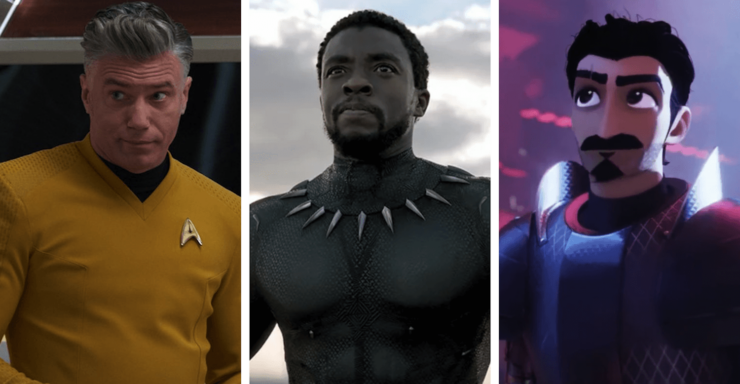
It’s hard to find male role models (or female ones) who are realistic and emulatable. Very few are “everyman” and often have skills no-one else is likely to have. Sometimes I wonder about the sheer size of American Special Forces given the number of heroes who are supposed to originate from them.
The nearest I can think of was Conrad Henley in Tom Wolfe’s “A man in full”, who discovers stoic philosophy whilst in prison.
Michael Carpenter from the Dresden Files is a non-judgmental Catholic, loving father, kind and generous to everyone he meets, and wields a holy sword.
I love that your list includes Henry Deacon. And Iroh, of course.
And John Robinson, from (new) Lost in Space.
Richter from Castlevania Nocturne!!
Not technically “male” per se (unless he’s trying very hard) but: Aziraphale from Good Omens. Why shouldn’t you strive to be kind, intelligent, polite, and have excellent gustatory tastes?
Commander Chakotay, from Star Trek Voyager.
BLESS you for including Henry Deacon! As much as I adore “Eureka,” it was constantly on the edge of “Town geniuses make fun of non-genius sheriff until his common sense and intuition saves the day” — and often tipped over that edge. When it didn’t, it was usually due to Joe Morton’s secret sauce as Henry, the wise, warm, witty, and mostly ego-free genius AND regular guy.
Actually, I immediately thought of Faramir (as written by Tolkien, that is, rather than the movie version).
Magnus Chase from the Magnus Chase and the Gods of Asgard trilogy by Rick Riordan. Unlike the children of Odin and Thor, Magnus isn’t much of a fighter. He’s the healer/ comic relief member of the party, providing emotional support when needed and freely admitting that everyone else is more qualified than him to lead missions. There’s a good quote in Hammer of Thor that sums it up: “I couldn’t always fight my friends’ battles. The best I could do was be there to heal their injuries.”
From not science fiction, but perhaps fantasy – Bandit, from Bluey. A realistically competent dad, and one that inspires others to do better, at least for 15 minutes at a go.
I am deeply amused that my thinking “This will be a list FULL of Dads” before reading this article was entirely correct.
I am also going to be That Guy and suggest that Mr Bruce Greenwood deserves at least some credit for making Chris Pike a Dad – Mr Anson Mount is the gold standard, but STAR TREK 2009 had already given us our first glimpse of ‘Captain Daddy’.
Puss in puss in boots: the last wish has a really relevant arc: he goes through the film learning the importance of community and therapy. Really beautiful stuff.
No idea why James T Kirk isn’t on that list, but here he is now.
I was telling my wife about this, because we were fans of Eureka, and have recently been doing a re-watch of The Middleman, and her question was “What about a list of female role models?” Is there one in the works?
How about the Star Trek captain who was actually a daddy — Benjamin Sisko anybody? Okay, he wasn’t perfect, but at least his relationship with Jake seemed natural and genuinely fatherly.
Anson Mount’s Pike seems like the kind of new age, trying-too-hard-to-be-a-nice-guy college professor dad who wears sandals, sits on his desk, and insists you call him by his first name, then his son grows up to be a psycho. The guy’s nothing but a hairdo.
Aral Vorkosigan from Bujold’s Vorkosigan Saga. Busy running his planet but always taking an hour at lunch to play at home with his talented but special needs son. (And then his son, Miles, returns the favor by taking lots of time to help out his newly discovered clone brother.)
I thought immediately of Vesemir in The Witcher (TV version), who keeps the winter retreat and serves as a father-figure to Gerault and the others. It’s wonderful to watch him interact with Gerault, and to see Gerault come to terms with raising Ciri. Maybe not “good Dads” but it’s nice to see the story take time with these relationships
I also recommend Strange World, the overlooked Disney sci-fi film of last year that features a queer protag and explores a grandfather/father/son relationship.
Thank you for including Henry! There were a few moments where he seemed shady (memory erasure, anyone?) but overall just a really good guy. Vincent was always a good guy on that show as well.
I’d add Mr. Universe as well as Steven.
One nitpick though: Nimona isn’t a “she”; they’re a “they”.
I may one of the oldest of Old Fogeys…but I always admired Lazarus Long. Gruff on the outside, someone who respects both men and women who stand up to him, but suffers no fools gladly.
Granted, he’s more of a Gary Cooper/Clint Eastwood/James Coburn type…but were they such bad role models, in general?
Do teens even read Heinlein these days?
Sam Vimes
The first character I would put on the list is Aragorn (or more specifically, Viggo Mortensen’s portrayal of him in the films).
Positive masculinity at its finest.
Reese from the original Terminator movie.
A vote for Bujold’s Penric here, and how and why he treats Desdemona as a *person* (It would probably be a Very Bad Thing for Desdemona and Murderbot to share any sort of data space). And then he teaches a junior sorcerer how to raise *her* demon as a child.
Cheese is truly the goodness and heart that should exist in all of humanity! At such a young age he showcases so much wisdom. He is my favorite character on Rez Dogs. I’m excited to see him included!
@26
Man I gotta start watching Rez dogs again.
Genly Ai and Gaverel Rocannon.
Nolan in the much-lamented ‘Defiance’, adoptive father of Irisa. Rafe McCawley probably also qualifies!
@16. Arlo: I know the ‘do is mesmerising, but I think you may have missed quite a bit of what makes the man whilst admiring his mane …
I’m cracking up at the idea of comic!Ballister being a good role model for boys. Boys, let’s start a plague with poison apples. Boys, go rob a bank! Boys, here’s how to choose between your ex and your best friend/adopted child. I love comic!Ballister dearly because he is no role model (and in the book his found family with Nimona is actually much sweeter, with none of that metaphor transphobia in the movie.) If you’ve only seen the movie, the graphic novel has funnier jokes, men with long flowing hair, a trans-er take on shapeshifting gender and a shark with boobs.
@arlo Seconded! Sisko’s a great dad and a very human captain.
Oooh non-toxic masculinity is one of my favorite topics, actually, along with my own view on feminism. In a way they both interact.
The two I thought of immediately were:
Faramir from Lord of the Rings (book version especially) – there were some really lovely articles on Tor awhile back about how awesome Faramir is but he’s just a decent dude. He is a strong fighter, but doesn’t enjoy fighting for fighting’s sake. He’s a bit bookish and a bit sensitive. He has the wisdom/humility to turn down the Ring. Plus Eowyn, arguably the coolest woman in Middle Earth, digs him.
Luke Skywalker – this feels so cliche but he truly was a figure I imprinted on (along with Faramir), even more so than Han. Again, ‘decent’ is the word I am thinking of. He’s a guy that just…cares. He’s not as flashy or cynical or sarcastic or as cool as Han, and he can be a total badass, but in the end, he wins the day with compassion and hope. The sequels are only kind of half-canon to me (for a multitude of reasons), but even within that, by the end, he manages to pull himself out of his funk/disillusionment for one last great (nonviolent) stand.
Both are characters who never use their strength/power for their own glory or ambition, or to dominate others, but to serve and protect.
I could probably think of more but those are the two that come to mind at the moment!
#30.
Hey, I’m just telling you what I see in the man (and in his Star Trek show) and that ain’t a whole lot. It’s an occasionally nice diversion, I admit, but it’s little more than that for me. So far.
In comparison to other Treks, I’ll quote my fellow snob, Niles Crane: “This is piffle. No, not even piffle. It’s piffle lite.”
#33.
I agree to an extent. I’ve enjoyed ST:SNW but it is pretty light. The end of the last episode of season 2 shows the outcome of “trying too hard to be liked by everyone”, where he’s lost when he actually needs to make hard decisions. This is a role model and supposedly one of Star Fleet’s most respected captains? The end of that episode is the demonstration why he isn’t a role model.
What about Prince Sebastian from the Prince and the Dressmaker. He loves dresses and grows from his arrogance. I think the world would be a much better place if more men were given space to experiment with gender like that.